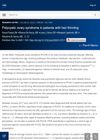Polycystic Ovarian Syndrome Revisited
March 2023
in “
Scholars international journal of obstetrics and gynecology
”

TLDR PCOS is a complex condition that affects women's hormonal balance and metabolism, requiring lifestyle changes and medical management.
Polycystic Ovarian Syndrome (PCOS) is a complex condition affecting women's metabolic and endocrine systems, leading to symptoms such as irregular menstruation, hirsutism, infertility, and increased cardiovascular risk. It is associated with insulin resistance and elevated testosterone levels. PCOS diagnosis can occur without ovarian cysts and involves various criteria, including the Rotterdam and NIH criteria. Management includes lifestyle changes, medical treatments for metabolic issues, and surgical options to improve ovulation. The prevalence of PCOS ranges from 2.2% to 26%, depending on the diagnostic criteria. Women with PCOS should be screened for glucose intolerance and type 2 diabetes, particularly if they have additional risk factors. Regular follow-up is crucial for managing long-term complications.

